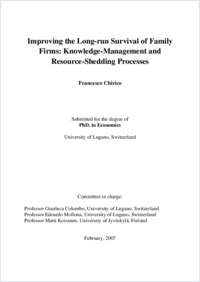Improving the long-run survival of family firms : Knowledge-management and resource-shedding processes
- Chirico, Francesco
- Colombo, Gianluca (Degree supervisor)
-
29.02.2008
159 p
Thèse de doctorat: Università della Svizzera italiana, 2008 (jury note: summa cum laude)
English
The present PhD Thesis aims to better understand and improve the long- run survival of family firms. It is composed of four articles: the first two focus on knowledge integration and accumulation; the last two, rather, concentrate on business exit and regeneration. The research conducted reveals that family firms eager to survive across generations need to accumulate and integrate knowledge over time. However, in failing situations, when the business is not profitable anymore, family firms need to be aware of the possibility of business exit, thereby redirecting resources towards more desirable business opportunities, rather than persisting with a failing business activity. The Falk case study is an excellent example of how business exit can lead to business regeneration. Hence, effective resource management, including knowledge management and resource shedding, is central to enable a family organization to have a sustainable competitive advantage over time. However, since feeling and emotions are very intense in family organizations, family involvement to the business can strongly influence in both positive and negative ways resource-management processes.
- Language
-
- English
- Classification
- Economics
- License
-
License undefined
- Identifiers
-
- RERO DOC 9762
- URN urn:nbn:ch:rero-006-108197
- ARK ark:/12658/srd1318151
- Persistent URL
- https://n2t.net/ark:/12658/srd1318151
Statistics
Document views: 358
File downloads:
- Texte intégral: 232
